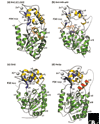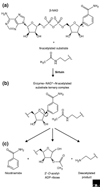Sirtuins: Sir2-related NAD-dependent protein deacetylases
- PMID: 15128440
- PMCID: PMC416462
- DOI: 10.1186/gb-2004-5-5-224
Sirtuins: Sir2-related NAD-dependent protein deacetylases
Abstract
Silent information regulator 2 (Sir2) proteins, or sirtuins, are protein deacetylases dependent on nicotine adenine dinucleotide (NAD) and are found in organisms ranging from bacteria to humans. In eukaryotes, sirtuins regulate transcriptional repression, recombination, the cell-division cycle, microtubule organization, and cellular responses to DNA-damaging agents. Sirtuins have also been implicated in regulating the molecular mechanisms of aging. The Sir2 catalytic domain, which is shared among all sirtuins, consists of two distinct domains that bind NAD and the acetyl-lysine substrate, respectively. In addition to the catalytic domain, eukaryotic sirtuins contain variable amino- and carboxy-terminal extensions that regulate their subcellular localizations and catalytic activity.
Figures




References
-
- Gottschling DE, Aparicio OM, Billington BL, Zakian VA. Position effect at S. cerevisiae telomeres: reversible repression of Pol II transcription. Cell. 1990;63:751–762. Yeast telomeres have an epigenetic effect on the transcriptional repression of nearby genes. - PubMed
-
- Palladino F, Laroche T, Gilson E, Axelrod A, Pillus L, Gasser SM. SIR3 and SIR4 proteins are required for the positioning and integrity of yeast telomeres. Cell. 1993;75:543–555. Yeast Sir3p and Sir4p are localized to telomeric regions and are required for telomeric localization and formation as well as for telomere-associated gene repression. - PubMed
Publication types
MeSH terms
Substances
LinkOut - more resources
Full Text Sources
Other Literature Sources

